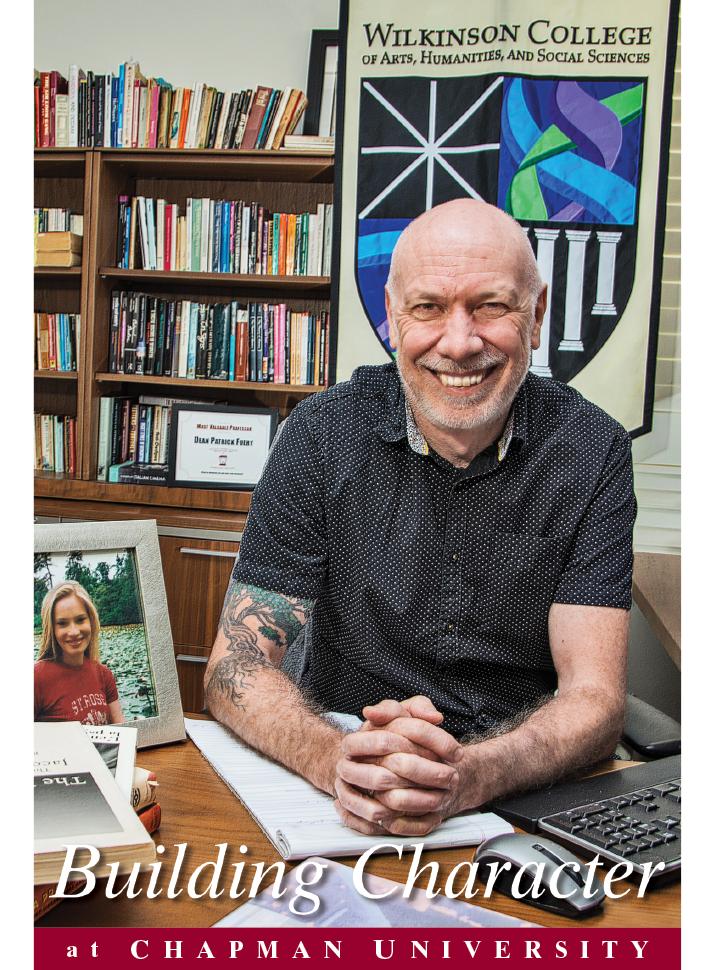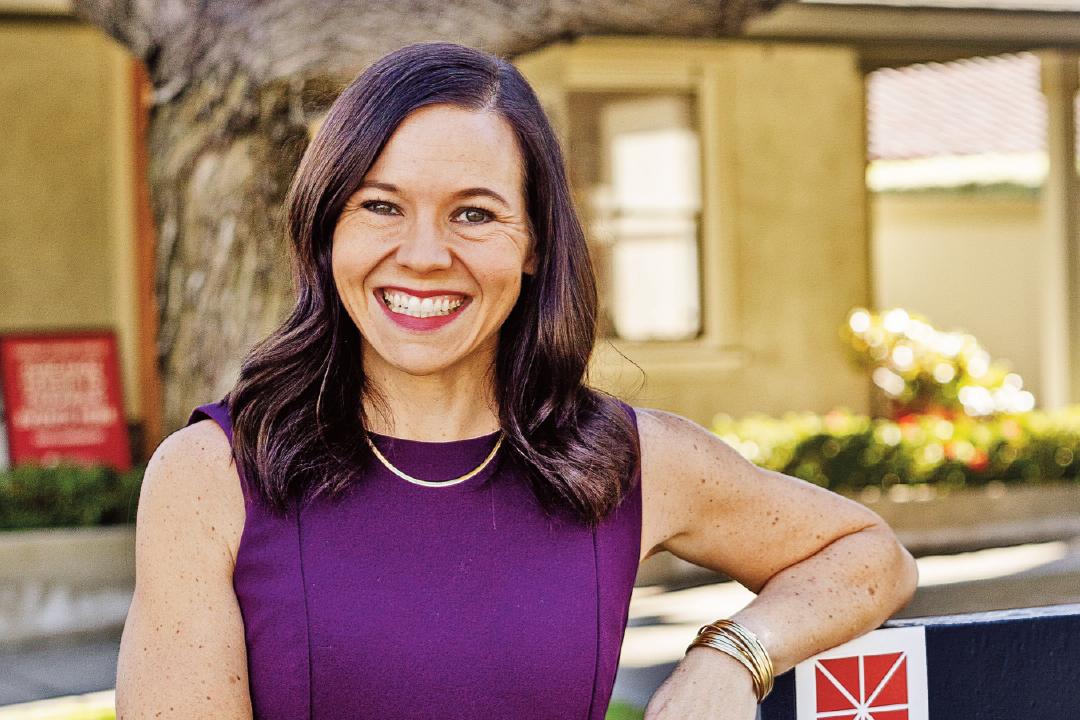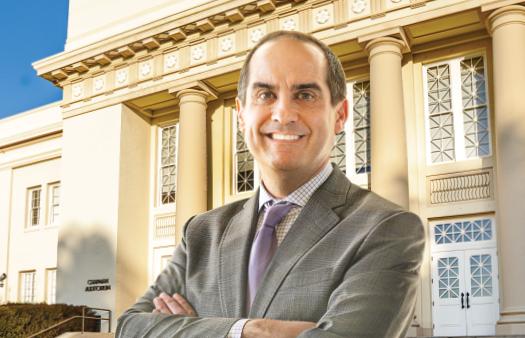
Dr. Patrick Fuery
If you have a keen ear for accents, you might be a bit baffled when you initially speak with Patrick Fuery. Chapman University’s Dean of Wilkinson College of Arts, Humanities and Social Sciences sounds British and Australian. There’s a good reason for this. Fuery spent formative years in both countries.
“It’s an odd accent,” admits Fuery, who was born in England and then moved to Australia at the age of eight. In Australia, he completed most of his schooling, including attending college and earning a Master’s in Philosophy and a PhD in Comparative Literature from Murdoch University. He returned to England in his late twenties and worked at the University of London (Royal Holloway College) and Sussex University.
Those experiences crossing between cultures colored the work Fuery has done throughout his career, including at Chapman University, where he joined the faculty in 2008.
In addition to day-to-day management of the university’s largest college, Fuery authors books that examine culture within a variety of contexts. He’s the author of eight books, including Madness and Cinema: Psychoanalysis, Culture and the Spectator. He also wrote Visual Cultures and Critical Theory with his wife, Kelli Fuery, an assistant professor at Chapman’s Dodge College of Film and Media Arts.
Fuery is currently working on a book examining how our bodies are much more than physical vessels. He’s looking at how they’re culturally represented in creative industries such as film and art. This idea funnels into another area that interests him—that of culture and creativity.
Culture and Creative Industries Initiative
Since arriving at Chapman, Fuery has spearheaded projects that examine and address culture in various contexts. His current project is an initiative to develop Culture and Creative Industries (CCI) on the Chapman campus and to encourage a partnership in this area with the European Union (EU), which awarded Fuery and his team a $200,000 grant for that purpose in 2015.
“Culture and Creative Industries is an umbrella term referring to a range of cultural activities and industries that often go unrecognized for their economic and social value to society,” says Fuery. “These include fine and graphic arts, film and performing arts, writing, publishing, advertising and public relations, design and fashion, architecture, R&D, crafts, toys and games and internet content creation.”
Fuery explains how CCI originated. “About 15 years ago, the British government identified that though they studied many elements of their country’s economy, they weren’t measuring the culture and creative industries. So they undertook a large-scale analysis of the economic impact of industries such as film and media, fashion, tourism and restaurants and food. This resulted in the creation of a Creative and Cultural Industries government office and resulting university degrees. Other countries like China, Australia and New Zealand followed suit.”
As Fuery sees it, Southern California is the ideal region to study CCI. “Although the area is rich in Cultural and Creative Industries, except for the film industry that fact hasn’t been acknowledged,” he says. “We’re working to change that by developing a minor in CCI that will launch within the next year. In keeping with the University’s mission of global learning, we’re also planning joint, concurrent courses for students at Chapman and a school in London.”
Stephanie Takaragawa is an Associate Professor and Associate Dean of the Wilkinson College of Arts, Humanities and Social Sciences in the Department of Sociology. She feels that Fuery’s work is helping to create global citizens.
“Patrick has brought a great deal of vibrancy to the college through his Cultural and Creative Industries initiative,” she says. “This initiative helps bridge students, faculty and staff in our college with others in business, film, science and communication.”
Rafael Luévano is an Associate Professor in the Religious Studies Department and Catholic Chaplain on campus. “Dean Fuery offers a creative leadership style that envisions new expressions for Wilkinson College,” he says. “He addresses the academic challenges of the 21st century. In addition, under his leadership, student research has increased and reached a new level, as has external funding for that research.”
The Overarching Importance of Creativity
In relation to the work with CCI, Fuery strives to increase awareness of the importance of creativity and how it’s fundamental to many fields.
“At the university, we’re striving to show relevance to students coming through the arts and humanities and social science classes,” he says. “Our subject matters has always attracted a large amount of students, but at this juncture in the early part of the 21st century, we want to make the curriculum as relevant and topical as possible so that any student can look at his or her particular subject matter in a more creative manner.”
Fuery has also worked to engage the community in topics of interest. “For five years now, we’ve held interstice events for the general public,” he says. “These events came out of my belief that at some point, many universities lost connectivity with the wider public. I wanted the campus to become more invitational and to offer events that the general public would want to attend. The aim is to entertain, engage and inform.”
Each year, Fuery picks a different theme for the interstice events. “Two years ago, we chose the theme of reWILDing with the idea that we have lost the capacity to get in touch with the wild part of ourselves, because we’re restrained by social order,” he says.
For that event they brought in New York Times best-selling author Cheryl Strayed to discuss her book Wild, which chronicles her journey of self-discovery backpacking 1,100 miles of the Pacific Crest Trail.
This year’s theme is Beyond Human AI and Emotion. “I was inspired after watching ‘Westworld,’ ” says Fuery. “Lisa Joy, the co-writer, producer and director of “WestWorld,” will be appearing, as well as various individuals who can speak about AI as a threat and how it could change humanity.”
Takaragawa is impressed with the wide variety of events Fuery conceives and initiates. “Patrick is always trying to find ways to improve the college and keep it at the forefront of the university,” she says. “Wilkinson is the heart of Chapman, so it’s a tall order, but he’s keeping us on target by continuing to provide pertinent, as well as innovative and experimental classes and events to engage the diverse Chapman student body.”
Destined to Write and Teach
The world can thank Fuery’s high school English teacher for ensuring that he fulfilled his destiny to write and teach.
“My parents had no formal education, and I grew up in a rough neighborhood where the vast majority of kids never went to university,” he says. “When my English teacher asked what I planned to do after high school, I told her I’d be getting an apprenticeship to be an electrician. She paused when I said this and then called my parents to come in the next day. At the meeting, she told them I should go on to university. I was so happy, because I had always dreamed of writing.”



